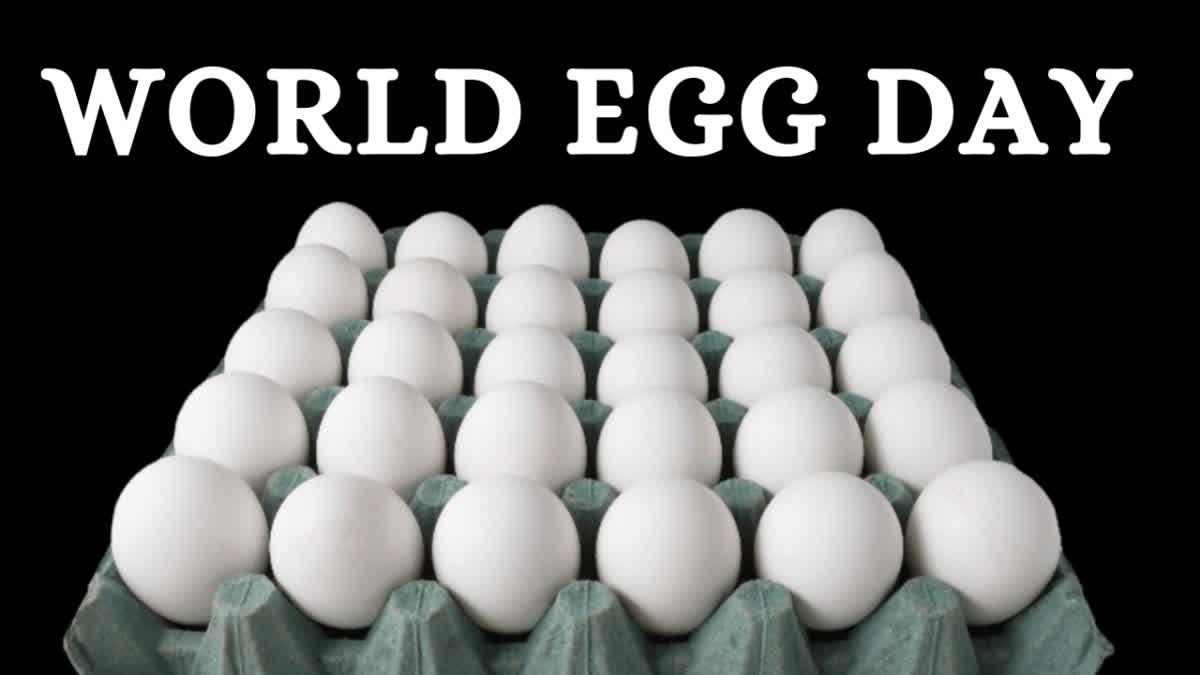Hyderabad: World Egg Day, observed on every second Friday of October annually, is occasion to remember the significance of egg as a nutritious, easily accessible food source. This observance aims to highlight the vital role eggs play in providing essential nutrients like high-quality protein, vitamins, and minerals to individuals of all ages.
Eggs, the epitome of versatility in the culinary world, offer a delightful taste in various forms—be it omelettes, burji, or ghotala. They also embody health and ease of preparation.
History- The history of World Egg Day dates back to its establishment in Vienna in 1996, with the decision to celebrate the mighty egg's prowess on the second Friday of October annually.
Theme- This year's World Egg Day theme is 'Eggs for a healthy future'. The theme underscores the nutritional potency of eggs and their potential to combat prevalent nutrient deficiencies globally.
13 Essential Nutrients and Vitamins in Eggs-
- Vitamin D: Vitamin D plays an important role in calcium and phosphorus absorption, making it essential for the maintenance of healthy bones and teeth.
- Vitamin B12: Vitamin B12 is essential in the formation of red blood cells and DNA, repairing body tissue, and maintaining the healthy function of the immune and nervous systems.
- Choline: Choline is a little-known yet important nutrient that plays a vital role in brain development and function – essential in prenatal human health as well as adulthood.
- Iron: Iron is an essential dietary mineral that is involved in various primary functions, including the transport of oxygen throughout the body and providing energy for daily life.
- Lutein and Zeaxanthin: Lutein and zeaxanthin are vital antioxidants, which protect your cells from damage. Most notably, they support the clearance of free radicals and serve in protecting against eye conditions.
- Riboflavin (Vitamin B2): Riboflavin – also known as vitamin B2 – is necessary for cell growth, energy metabolism, red blood cell development, healthy vision, and the sound functioning of the nervous system.
- Pantothenic Acid (Vitamin B5): Pantothenic acid, commonly known as vitamin B5, plays a significant role in converting the food you consume into active energy and breaking down fats.
- Vitamin A: Vitamin A is vital in sustaining healthy skin, supporting immune function, maintaining good vision and promoting general reproductive health.
- Vitamin E: Vitamin E has beneficial antioxidant properties that play a pivotal role in maintaining good general health – including heart health – with studies linking it to lower rates of heart disease.
- Phosphorus: Phosphorus is essential for the development and maintenance of healthy bones and teeth, filtering waste and repairing tissue and cell membranes. It also contributes to supporting energy metabolism and muscle growth.
- Folate: Folate is an important nutrient for people of all ages, playing a significant part in promoting red blood cell growth, the formation of DNA and supporting an effective immune system. In particular for pregnant women, folate helps in the production of new cells, protecting against serious birth defects, such as spina bifida.
- Iodine: Iodine is an important mineral in helping your thyroid to produce hormones to regulate your body’s metabolic rate. It also serves in promoting cognitive function, optimal brain development and maintaining healthy skin.
- Selenium: Although only required in trace amounts compared to other vitamins and minerals, selenium is an important antioxidant that helps prevent free radical damage to cells in the body.
In the context of India, eggs occupy a unique place in the culinary landscape, often referred to as the "ultimate fast food" by culinary experts. The country ranks third globally in total egg production, with significant contributions from states like Andhra Pradesh, Tamil Nadu, Telangana, West Bengal, and Karnataka. The per-capita availability of eggs has seen a remarkable increase, highlighting the growing popularity and importance of eggs in the Indian diet.
Interesting facts- an egg shell can have as many as 17,000 pores, and the color of the shell and yolk varies without affecting taste or quality. Commercial eggs mainly come in brown or white, with some breeds laying blue, green, or pink eggs. Duck eggs, higher in fat, are favored for baking, and hens diligently turn their eggs to prevent the yolk from sticking to the side.
- An average hen lays 300 to 325 eggs per year.
- An average hen lays 300 to 325 eggs per year.
- A hen turns her egg nearly 50 times a day to keep the yolk from sticking to the side.
- Kiwis lay the largest eggs in relation to their body size of any species of bird.
- The word “yolk” derives from an Old English word for “yellow”. Therefore, it is egg white and egg yellow.
Vision 365- Vision 365 is a 10-year plan launched by the IEC (International Egg Commission) to unleash the full potential of eggs by developing the nutritional reputation of the egg on a global scale. With the whole industry’s support, this initiative will enable us to build the reputation of the egg based on scientific fact, positioning eggs as an essential food for health.


